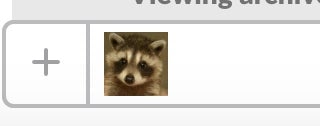Fend off annoying co-workers on Slack with a conversation “raccoon”
Slack was designed to make workplace communication more efficient. Yet far too often, it feels like middle school AIM: a joyous time suck where banter thrives and productivity goes to die.


Slack was designed to make workplace communication more efficient. Yet far too often, it feels like middle school AIM: a joyous time suck where banter thrives and productivity goes to die.
And in Slack-dependent offices, nothing threatens productivity quite like employees who prolong unnecessary conversations. It should be easy for managers, or anyone else, to curtail such distractions, but as anyone who has ever texted knows, tone and intention are easily misinterpreted online. A simple plea of “Take this conversation somewhere else,” if sent by your boss, can easily translate to “shut up, you incompetent fool.”
Thankfully, Slack is aware of this problem, and has created a solution that’s available to all Slack users, regardless of their industry or employer. That solution is a tiny raccoon.
“It’s called the ‘polite raccoon,’ to be specific,” Slack co-founder Cal Henderson tells Quartz At Work. The polite raccoon is a custom emoji that Slack designed for use on its company’s Slack (yes, you can do that). At Slack, employees use the polite raccoon to signal a desire to discontinue conversations that are off-topic, irrelevant, or straight-up annoying.
“Basically, if there’s a discussion between two people that should be happening somewhere else, I send the polite raccoon emoji and say ‘I’m raccooning this,’ which means ‘move it somewhere else,'” says Henderson.
He doesn’t quite remember when “raccooning” started, but says it was born to curtail tangents: “We wanted some way to say ‘I’m not trying to be aggressive about this, I’m not being a dick, but this is better somewhere else.’ The raccoon is seen as a polite way of saying that, instead of saying ‘please shut up,’ or ‘you’re in the wrong.'”
Behold, the polite raccoon:

Adorable, right? Yet firm and defiant. Also sort of compassionate. Like your dog being told he can no longer pee on the rug (he will always pee on the rug).
The whole mild head tilt is intentional, Henderson adds, as it gives the polite raccoon a soft feel. Henderson says that in other images, the polite raccoon’s hands are crossed. Imagine Dr. Evil, but fluffy.
While the polite raccoon does not come pre-installed on your company’s Slack, you can easily create your own polite woodland creature. At Quartz, we have a “conversation raccoon,” which no one remembers creating and few people have come across in the course of internal Slack chats but is a real treasure:

If someone is being offensive or seriously problematic on Slack—a platform on which sexism and implicit bias can thrive—a polite raccoon will not suffice. However, if your company, like Slack and Quartz, occasionally falls victim to tangents, creating a polite raccoon is an easy and effective way to maintain focus and avoid hurt feelings.
Of course, there’s no reason to stop at raccoons, Henderson notes.
“The option to create custom emojis became a way that individual teams could shape their own culture,” he explains. “At Slack, a lot of teams end up setting custom emojis of people’s faces” —literally turning a photo of someone’s face into an emoji— “that way, you know, you can react to a comment or a link with a person’s face emoji. And it might not be to call that person’s attention, but to just indicate ‘Oh, this is so something that person would have said,’ or something they care about.”
Custom emoji are a great way to play off inside jokes “that wouldn’t make sense outside of the team,” Henderson says, noting that Slack’s largest emoji-using customers have created tens of thousands of custom emoji. “Which seems insane, but it’s not.”
Definitely not.